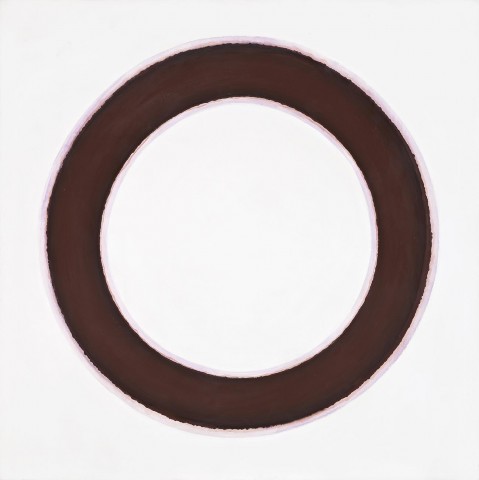CIRCLE MOVEMENT, 1973
STANISLAUS RAPOTEC
synthetic polymer paint on composition board
137.0 x 137.0 cm
signed, dated, and inscribed verso: S. Rapotec / Sydney, Jan. 1973
signed twice and dated on frame verso: S. Rapotec / S. Rapotec 1973
Private collection
Leonard Joel, Melbourne, 31 March 1982, lot 525
Charles Nodrum Gallery, Melbourne (label attached verso)
Private collection, Melbourne
Modern Australian Painting, Charles Nodrum Gallery, Melbourne, 3 – 26 May 2001, cat. 52 (illus. in exhibition catalogue)
Displaying perfect radial symmetry, Stanislaus Rapotec’s Circle Movement, 1973 is a rare expression of pure geometric abstraction within the artist’s oeuvre. Its confident and powerful composition reflects Rapotec’s unfaltering commitment to the concept and its subsequent execution. It is almost without parallel among the artist’s calligraphic gestural compositions, with which he won the 1961 Blake Prize for Religious Art. Circle Movement, however, still retains the ‘virility, drama and passion’1 that critics saw within his earlier work.
Hailed foremost as a gestural and textural abstractionist, Rapotec was instrumental in revising public hostility towards non-representational painting after the 1950s. Rapotec’s recent immigration from Eastern Europe was an advantage in Australia – despite being largely self-taught, he brought with him a considerable understanding of Tachiste paintings being created on the continent. He was consequently driven by a similar desire to make an aesthetic product of the physical act of painting. Circle Movement is no exception to this approach, featuring a strong linear central motif with slightly irregular borders that reflect Rapotec’s origin as a gestural abstractionist.
Despite its simple geometric composition, Circle Movement is not an example of modernist hard-edge abstraction, incorporating a delicate pink halo along the innermost and outermost edges of its central motif. The softly graduated edges of this pink interposition may recall, for contemporary audiences, the optical effects of Ugo Rondinone’s vibrant circle paintings. However, in Circle Movement, the emphasis is not on the central black ring, but instead on its relationship with the perfect square of its canvas support. This is a spatial interest he shared with abstractionists in New York, particularly Jasper Johns with his iconic target paintings of the late 1950s and Kenneth Noland’s circle paintings of the 1960s. The tension between these geometric figures is reinforced in Rapotec’s composition through a strong tonal contrast between the black motif and its clean, white support. Through the harmonious relationship between the positive and negative elements of its composition, Circle Movement encourages quiet reflection and meditation.
While circular forms were present in Rapotec’s paintings throughout his career, they were executed with a strong gestural and calligraphic quality. His expressive approach was primarily used to convey universal themes of spirituality and eternity, creation and destruction. Although formally very different to Rapotec’s earlier paintings of organic and celestial bodies, such as Spring, 1968 in the collection of the Art Gallery of New South Wales, Sydney, Circle Movement nevertheless displays a similar spiritual quality. Conveying the swirling movement of a form with no beginning and no end, Circle Movement has the power to mesmerise the viewer into a meditative state.
1. Thomas, L. ‘Stanislaus Rapotec’, Art and Australia, Ure Smith, Sydney, vol. 8., no. 2, 1970, p. 131
LUCIE REEVES-SMITH
